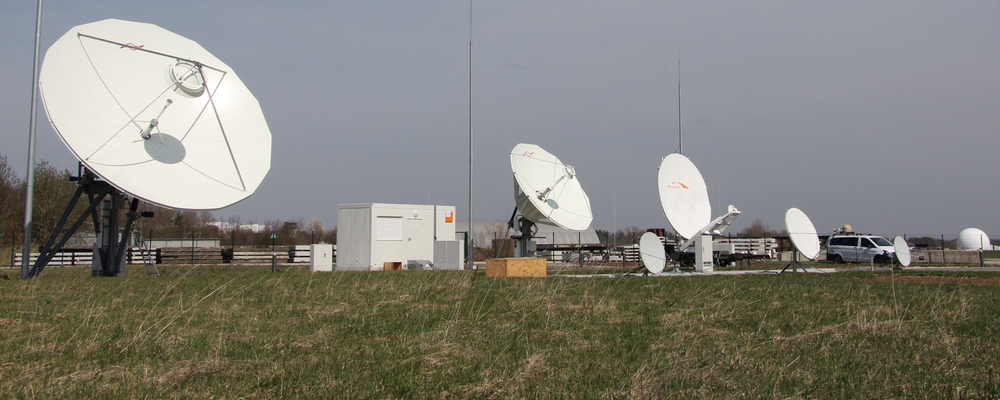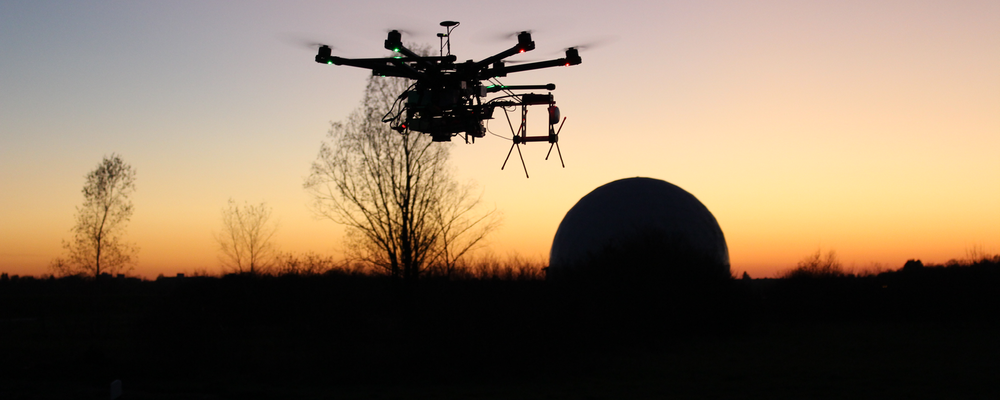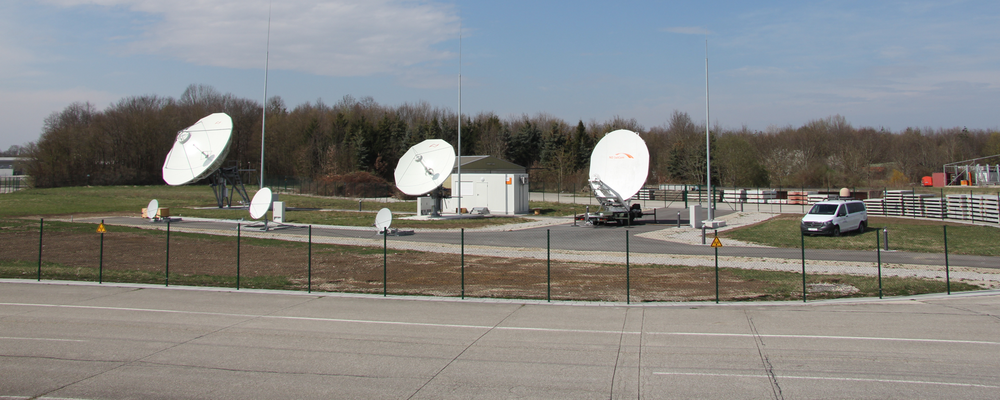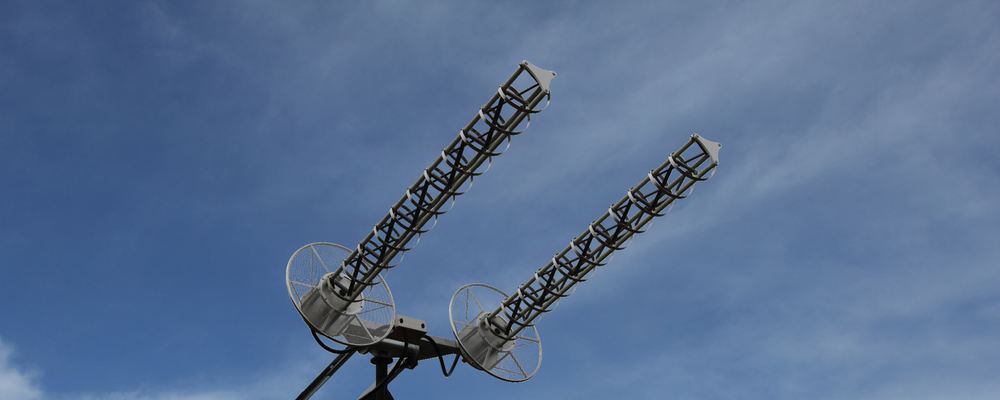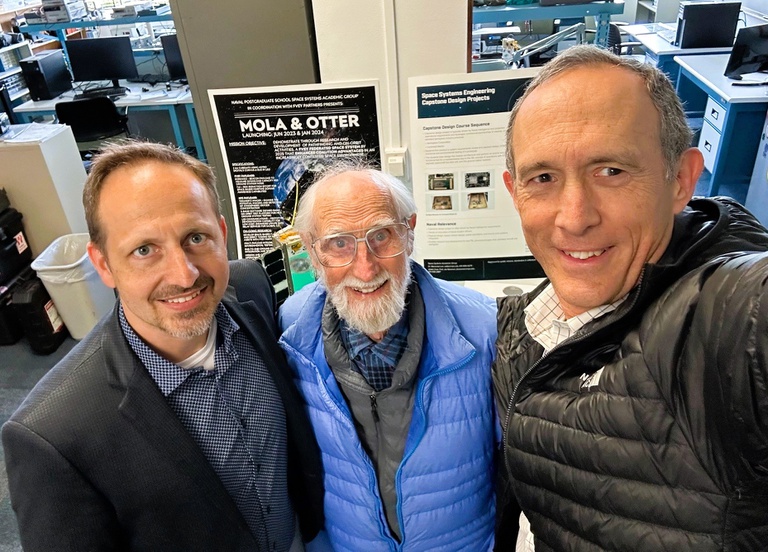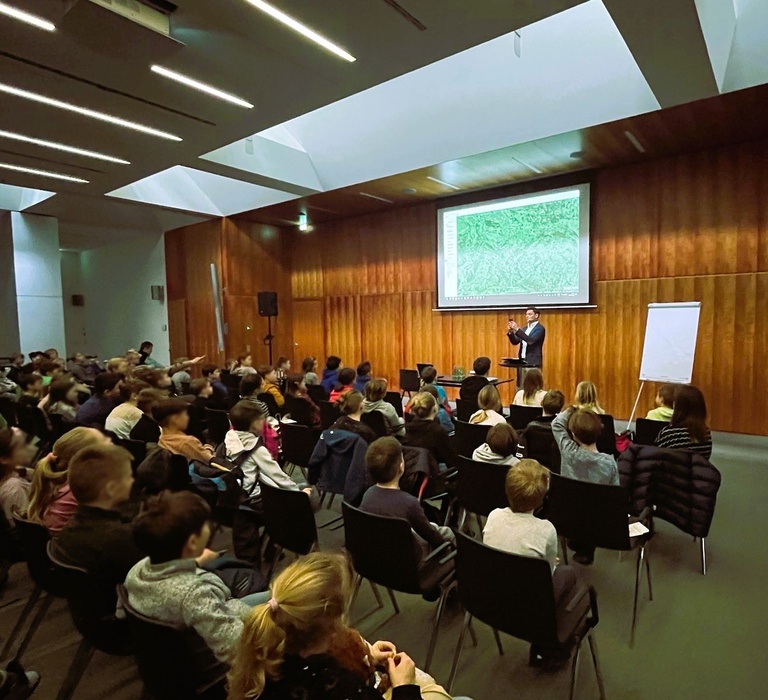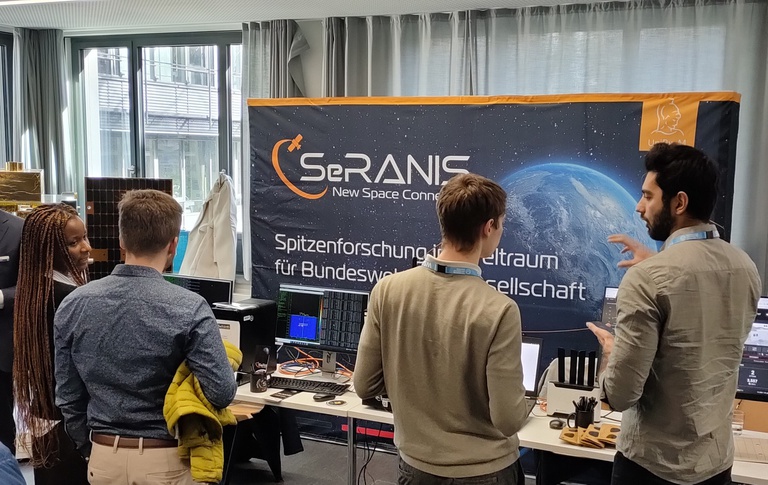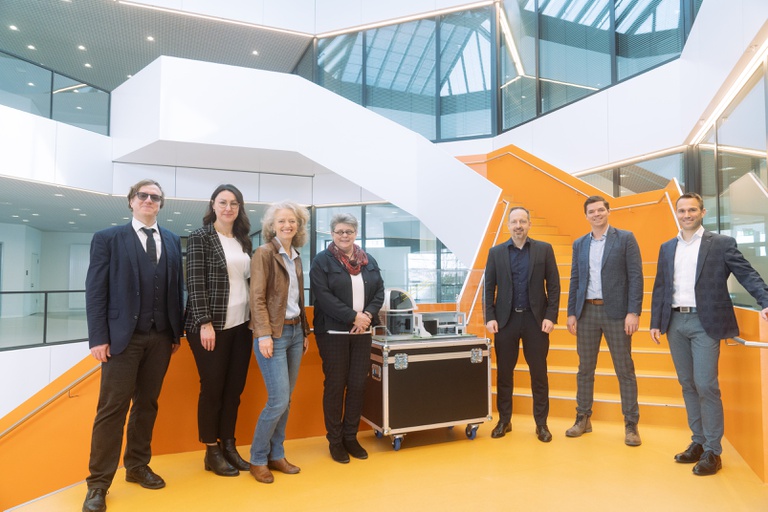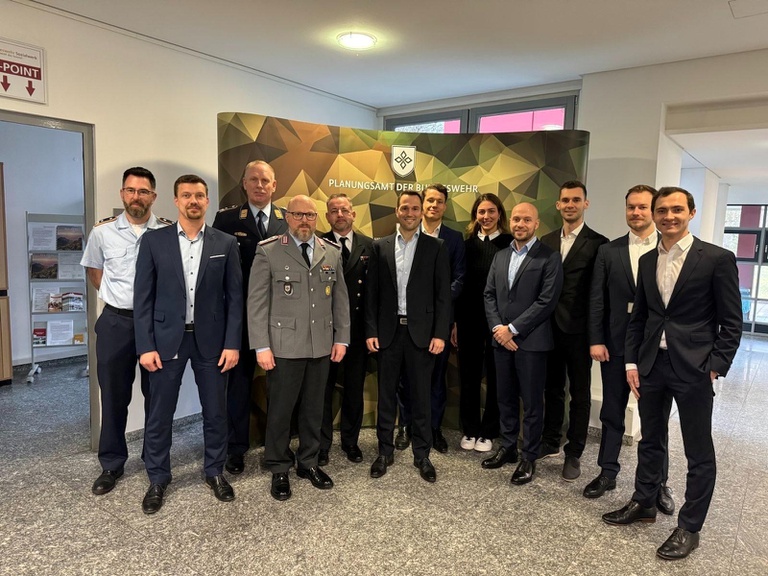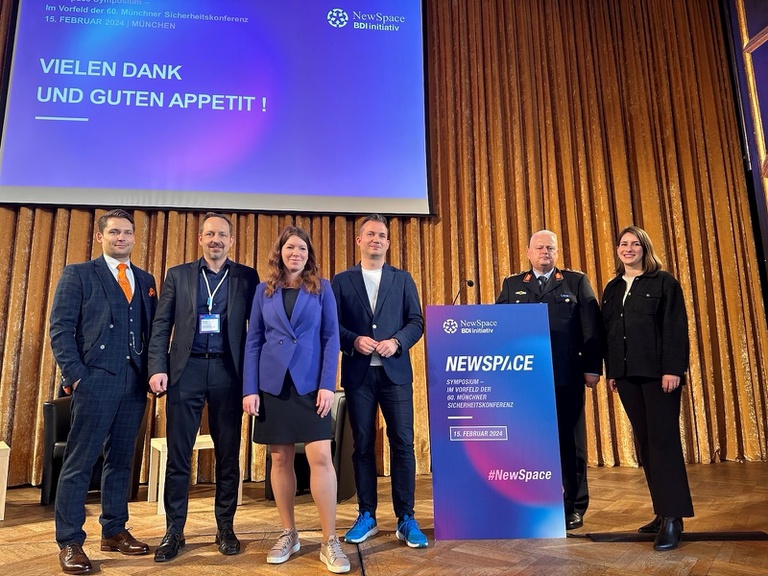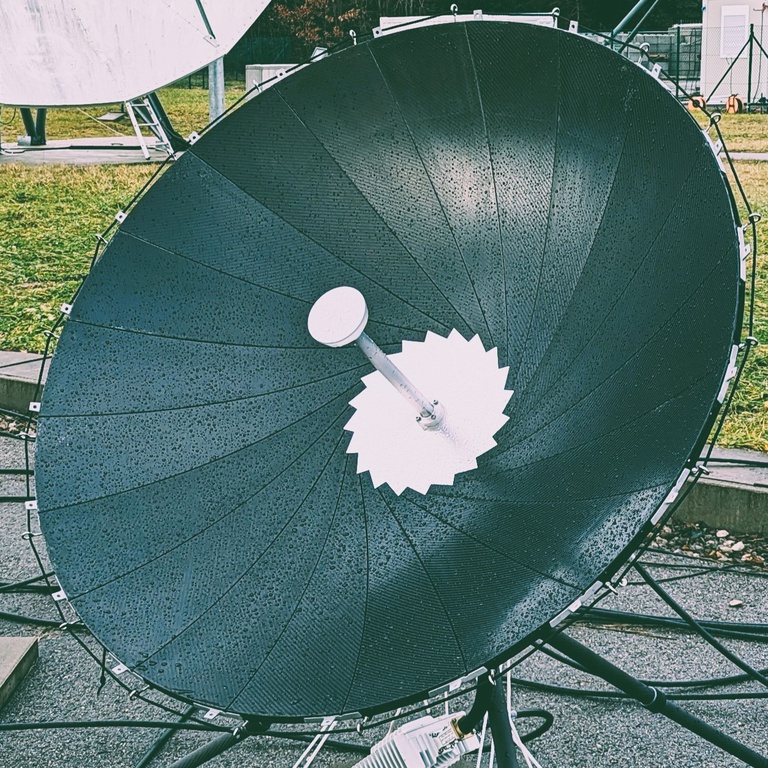| older News |
Cooperation within the NPS ground station network April, 2024: As part of the long-standing academic cooperation between the Naval Postgraduate School (NPS) and the University of the Bundeswehr Munich (UniBw M), which was initiated almost five decades ago by the now 95-year-old Emeritus Professor Rudolf Panholzer with professors from the then Faculty of Electrical Engineering, Prof. Andreas Knopp, himself a Recurring Visiting Professor at the Space Systems Academic Group, has completed another research visit. This time, the focus was on the small satellite project SeRANIS. Experts from the NPS, who recently successfully launched another small satellite called MOLA, were involved in the Critical Design Review (CDR) of SeRANIS in March. The first steps have now been taken towards the joint use of the NPS ground station network known as Mobile CubeSat Command and Control (MC3) network, a Department of Defense-sponsored effort that began in 2011 at NPS. Today, the MC3 network is used exclusively for projects of the alliance known as Five Eyes (FVEY) between the USA, Canada, New Zealand, the United Kingdom and Australia to pursue common interests in the field of signal intelligence. However, an expansion of the alliance to include Germany and France has been discussed and promoted for several years through various activities. "The special thing about the MC3 network today is that it is already home to American universities, civilian institutions, industry partners, and governmental agencies," says Andreas Knopp. "Even though we are still at the beginning, the SeRANIS project seems to be the perfect way to integrate Germany into the alliance with the unique small satellite infrastructure here at UniBw M. Signal intelligence will be one of the driving topics in the coming years, and small satellites will make their contribution. Therefore, it seems quite obvious that SeRANIS should act as a role model to be exploited in future mission for the Bundeswehr as well as in the NATO context. Strategic partnerships on all operational levels including academia are thus essential."
|
Enthusiastic junior researchers March, 2024: At the children's university in the Vogtland district in the city of Plauen, our expert Christian Hofmann attracted a very large audience with the topic of space.
Under the title "What's flying in space - and why?" more than 100 children learned why there are so many satellites in space, what their tasks are, and how they get into orbit and stay there. Hopefully, we have inspired many children and gained a new group of space enthusiasts and future engineers. |
B5G/6G Demonstrator at WSA 2024 From March 17–19, 2024, SeRANIS PhD students Diego Tuzi, Pheobe Agbo and Sertaç Kaya presented a B5G/6G Demonstrator in the exhibition area of the 27th International Workshop on Smart Antennas WSA 2024 hosted at TU Dresden with the co-sponsorship of IEEE, IEEE Communication Society, and 5G Lab Germany.
Our demo showed an operational example of integration between terrestrial and non-terrestrial networks in which the Core and Radio Access Network (RAN) of a mobile cellular system are connected through a Low-Earth Orbit (LEO) satellite network instead of a fiber connection. The Core side of the network was implemented using the open5GCore solution developed by Fraunhofer FOKUS, the end-to-end LEO satellite system was emulated using the opensource project openSAND, developed by CNES and Thales Alenia Space, and the RAN side used a gNB base station from Amarisoft which enabled over-the-air connection with conventional smartphones and modems. Our demo showed that common applications tolerate the delay and performance typical of LEO satellite networks. This type of architecture, namely LEO satellite backhauling, can extend the coverage of terrestrial networks into remote areas where fiber or microwave links cannot be installed, providing a quality of experience very similar to that of ordinary terrestrial networks. LEO satellite backhauling, together with direct connectivity between satellite and common terrestrial devices, will enable the ubiquitous connectivity envisaged by the ITU's IMT-2030 (6G) vision. Our ATHENE 1 satellite, among other experiments, will allow us to test RF/optical backhauling and direct connectivity solutions. We look forward to the launch of ATHENE 1, scheduled for 2025. We would like to thank the organizers of WSA 2024 for the warm hospitality and the audience for their interest and curiosity in our demonstration, the ATHENE 1 satellite and the SeRANIS mission. |
Visit by the President of BAAINBw March 14, 2024: Today, Annette Lehnigk-Emden, President of the Federal Office of Bundeswehr Equipment, Information Technology and In-Service Support (BAAINBw), visited the University of the Bundeswehr Munich (UniBw M). She visited us to find out about our research in the field of satellite communications, particularly in the context of the SeRANIS cutting-edge research project funded by dtec.bw. For 12 years now, our institute has been the first port of call for the BAAINBw in the field of scientific support and advice on military satellite communications. We have performed and consolidated this role in all major procurement projects to date, most recently in the design of the next generation of military communications satellites (SATCOMBw Stage 3). Earlier research contributions concerned the areas of SATCOM-on-the-Move, SATCOM in the Internet of Things (IoT), secure 4G/5G satellite networks and dealing with electromagnetic threats. President Lehnigk-Emden was particularly interested in future technologies in the field of optical communication, which will be further researched in the future as part of a newly created professorship at UniBw M with an optical satellite ground station. During a tour of our experimental ground station, its head, Dr. Robert Schwarz, also explained our technical capabilities and activities in the context of testing equipment and systems for the BAAINBw as well as his experience as a representative of the BAAINBw in NATO working groups on standardization (STANAG).
*dtec.bw – Digitalization and Technology Research Center of the Bundeswehr – is a scientific center jointly supported by both universities of the Bundeswehr and part of the German government's economic stimulus program to overcome the COVID-19 crisis. With its inclusion in the German Recovery and Resilience Plan (GRRP), dtec.bw is funded by the European Union – NextGenerationEU. |
|
Completion of the study "Responsive Space Capabilities of the Bundeswehr (RSCBw) Berlin, February 15, 2024 - The first study "Responsive Space Capabilities of the Bundeswehr (RSCBw)" has been successfully completed with the handover of the final report to the Bundeswehr Planning Office. Responsive space is becoming increasingly important with the ever greater reliance of services on space infrastructure and, particularly in the context of the global political tension and threat situation, is consequently occupying decision-makers in politics and the Bundeswehr.
In the one-year so-called non-technical study, the foundations for the conception and development of Responsive Space capabilities in the Bundeswehr were developed. In cooperation with the consulting firm Strategy&, our experts from the Space Research Center (FZ Space) at the University of the Bundeswehr Munich contributed their broad and in-depth knowledge of all space disciplines. The experience gained by our experts in the dtec.bw project "Seamless Radio Access Network for Internet of Space (SeRANIS)" is a particular added value. The SeRANIS small satellite mission pursues an innovative approach to accelerating space processes and is therefore considered a flagship project with regard to the rapid in-orbit delivery of space assets.The experience gained is already paving the way for the future development of the Responsive Space capability. With great interest on the part of the Bundeswehr's users and users of space infrastructure and with the attention of the Federal Ministry of Defense, clear recommendations for action were formulated at the end of the study, thus laying the foundation for the development of a Responsive Space capability for the Bundeswehr. We look forward to supporting the Bundeswehr in a possible next phase, which could then deal with the implementation of a demonstrator. *dtec.bw – Digitalization and Technology Research Center of the Bundeswehr – is a scientific center jointly supported by both universities of the Bundeswehr and part of the German government's economic stimulus program to overcome the COVID-19 crisis. With its inclusion in the German Recovery and Resilience Plan (GRRP), dtec.bw is funded by the European Union – NextGenerationEU. |
|
The importance of space systems for the future February 15, 2024: The New Space Symposium of the BDI's New Space Initiative, chaired by Matthias Wachter, took place for the third time in the run-up to the Munich Security Conference.
During the symposium, the strategic importance of space was discussed with more than 100 representatives from the NewSpace ecosystem. In addition to the panel with the Federal Government Coordinator for German Aerospace Dr. Anna Christmann, a second panel was held with Michael Vetter, Lieutenant General GAF and CIO of the German Bundeswehr, as well as Professor Andreas Knopp, Chairman of the SPACE Research Center at University of the Bundeswehr Munich. In the second panel, General Vetter reported on the structuring of the innovation ecosystem and the latest developments for more agility and innovative strength as well as the better use of external innovations from the private sector. The new instrument of "innovation corridors", for example, creates the opportunity to provide financial support for innovations over a longer period of time. To this end, the cyber agency is testing new models for promoting innovation through ideas competitions and the promotion of parallel competing solutions at various stages of the innovation process. Similar to the Cyber Innovation Hub, which stands for the rapid availability of IT solutions through the use of dual-use potential, there should be a further innovation unit for space technologies. This idea was also emphasized by the BR Space Commissioner, who has included the term "Space Innovation Hub" in the space strategy. In this context, General Vetter emphasized the importance of the small satellite mission SeRANIS, with which the Bundeswehr will make new capabilities available in low earth orbit for the first time in an agile process. Prof. Knopp emphasized in his speech that many ideas and concepts of a Space Innovation Hub are already being tested and implemented at the SPACE Research Center (FZ SPACE). Last but not least, the deep-tech satellite mission SeRANIS is a flagship project for technology and capability testing in the German Armed Forces. For many years, FZ SPACE has established itself as a nucleus for space innovations with a dual-use character. The panel then discussed various aspects and challenges of integrating innovative start-ups into the Bundeswehr's capability portfolio. The flexibilization of innovation and procurement processes is of particular importance here, with FZ SPACE contributing important experience from its own projects with the Bundeswehr. In particular, the early use of research results from the outstanding national research institutions in terms of product development by industry is currently not yet sufficiently possible. In the subsequent round of questions, investors emphasized that the financing of innovations is only possible if a reliable customer base can also be guaranteed in the defence department. |
Satellite network for mobile communications January, 2024: Few topics have received more attention in recent years than the integration of satellites in mobile communication systems. Recent research works focus on the so-called "direct-to-cell" connectivity, i.e. the direct connection between unmodified cell phones and satellites. Distributed beamforming technology - where a swarm of satellites calculates how it can best direct its signal to a particular receiver without interfering with other receivers - is one of the most important areas of research in this field. Three of our experts from the University of the Bundeswehr Munich, Chair of Signal Processing were interviewed on this topic for the renowned IEEE Spectrum magazine: PhD student Diego Tuzi, Dr. Thomas Delamotte (Team Leader for Digital Satellite Payloads & Satellite Monitoring) and Prof. Andreas Knopp (Director of the Chair for Signal Processing).
The article "Satellites are becoming the New Cellphone Towers" by journalist Lucas Laursens contains the most important facts about the latest developments in this field and discusses the upcoming challenges for research. You can find the whole article under the following link: https://spectrum.ieee.org/satellite-cellphone-starlink |
|
An antenna system for the backpack January, 2024: As part of the ILKA project (Integrated, Deployable Lightweight Manpack Complete Antenna), HPS High Performance Space Structure Systems GmbH is developing a portable antenna system in manpack format in collaboration with other project partners (Blackwave GmbH, Technical University of Munich, mtex antenna technology and Bundeswehr University Munich).
The entire system weighs less than 20 kg and has a 1.2 m wide reflector. The finished laboratory sample is currently undergoing an end-to-end field test at our test site in Neubiberg. The antenna system is characterized by innovations in its specially developed folding kinematics and the carbon sheet molding compound (SMC) process for manufacturing the reflector from a fiber-plastic composite. Both aspects pose special challenges for the electromagnetic properties of the antenna system. End of January, the usability and performance of this new antenna has finally been tested over-the-air at the Munich Center for Space Communications. |
| older News |
News 2024

